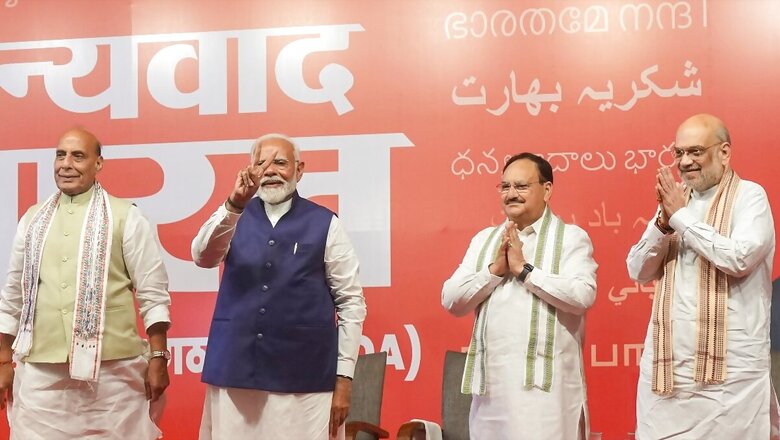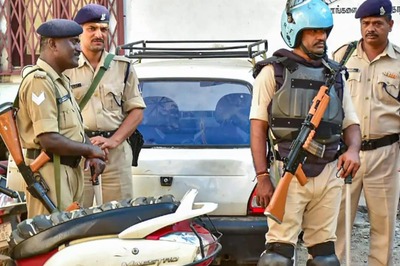
views
The Narendra Modi government’s first 100 days of the third term has been more Rahul Dravid than Virender Sehwag, Ajinkya Rahane than Rohit Sharma.
It has been cautious in the time of coalition. Leaving the bouncers and late swingers, like sending the Waqf Amendment Bill to a Joint Parliamentary Committee (JPC) and rolling back lateral entry of talented individuals in the government and scrapping indexation on capital gains.
But it has also sent mutually accepted loose balls to the boundary, like widening the Ayushman Bharat scheme for all seniors above 70, increasing the minimum support price (MSP) for the Kharif crop, no tax for the middle class on incomes up to Rs 7 lakh, and heavy investment on infrastructure.
The markets have responded to stability and the consultative approach, with the Sensex going up 6,300 points in the first 100 days.
But how will the next 100 days, or approximately the rest of this year, be for Modi 3.0?
Five broad domestic, international and hybrid challenges loom.
First, state elections in Maharashtra, Haryana, Jharkhand, and Jammu and Kashmir. None of it is going to be easy for the BJP. In Maharashtra, a hotchpotch of alliances and breakaway factions have made the arithmetic extremely complicated and unpredictable. While the Eknath Shinde-led Shiv Sena-BJP-Ajit Pawar alliance does not have much anti-incumbency against it, it got beaten in the Lok Sabha election probably because of low BJP-RSS cadre morale.
In Haryana, the BJP faces anti-incumbency which comes with 10 years in office. In Jharkhand, CM Hemant Soren going to jail for corruption may give him some sympathy from his tribal voters and save him from what could have been a rout. In J&K, the BJP heavily relies on sweeping Jammu to have a brush with power again.
The second challenge for Modi will be the Bangladesh crisis and the sensitive border, along with the Northeast situation.
Anti-Hindu and anti-India sentiments are rife in Bangladesh after Sheikh Hasina was dislodged, a Muhammad Yunus-led caretaker government was sworn in, and Jamaat and other Islamist forces took over a virtually police-less, lawless vacuum.
There are reports of Pakistani ISI and Jamaat men arriving by air and setting up bases in places like Ambarkhana in Sylhet. There are intel reports that there could be trouble in the coming months along India’s Assam and Meghalaya border.
The Manipur conflict is getting worrisome too, with Kuki guerrillas firing sophisticated rockets and drone-fired missiles, indicating the presence of a foreign hand.
The third challenge looms with the possibility of a full-blown war between Israel and Iran breaking out. Global crude prices will go further awry. Already, India’s goods exports in July dipped by 1.4 per cent year-on-year while imports rose by 7.5 per cent reportedly because of oil fluctuations.
The fourth challenge will be the outcome of the US elections in November. Two major international wars have erupted in Ukraine and Gaza and a messy withdrawal undertaken in Afghanistan during Joe Biden and Kamala Harris’s tenure. The US Deep State is suspected behind the regime change in Bangladesh and funding and abetting all sorts of violence and protests in India as well.
A Donald Trump term will be welcome. However, given the convergence of strategic interests, the US and India will have to trash out a path together, regardless of who is in power in either country.
Fifth and last, the Waqf Amendment Bill, intended to correct one of the worst legislation in independent India, the Waqf Act of 1995, which gives sweeping powers to Muslim clergy to claim and grab land. The JPC is expected to submit its report to Parliament soon, and if the Bill becomes an Act, the possibility of violent, foreign-funded protests is very real.
The next hundred days will be a lot more testing for the Modi government than the first hundred. It is time to show its steel.
Abhijit Majumder is a senior journalist. Views expressed in the above piece are personal and solely those of the author. They do not necessarily reflect News18’s views.




















Comments
0 comment